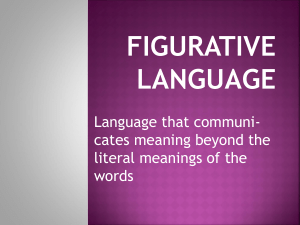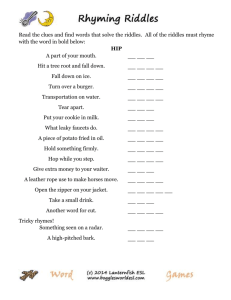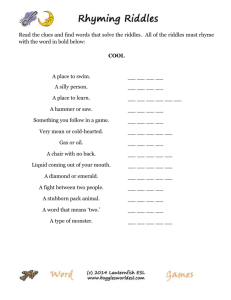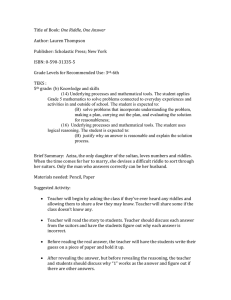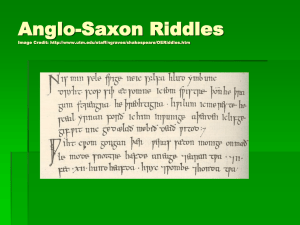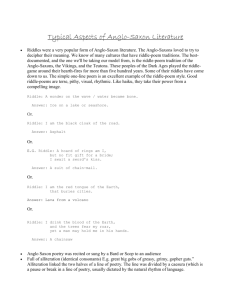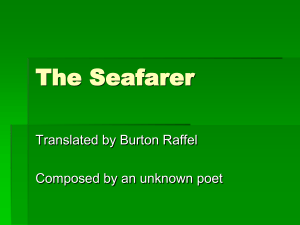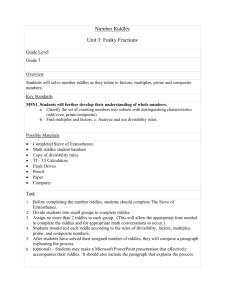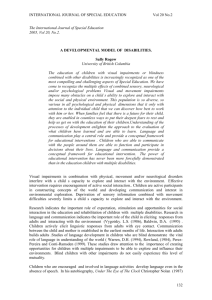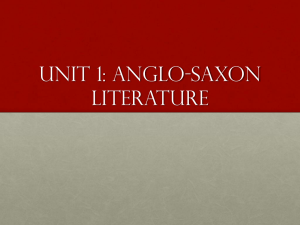Figurative language Examples in Beowulf
advertisement
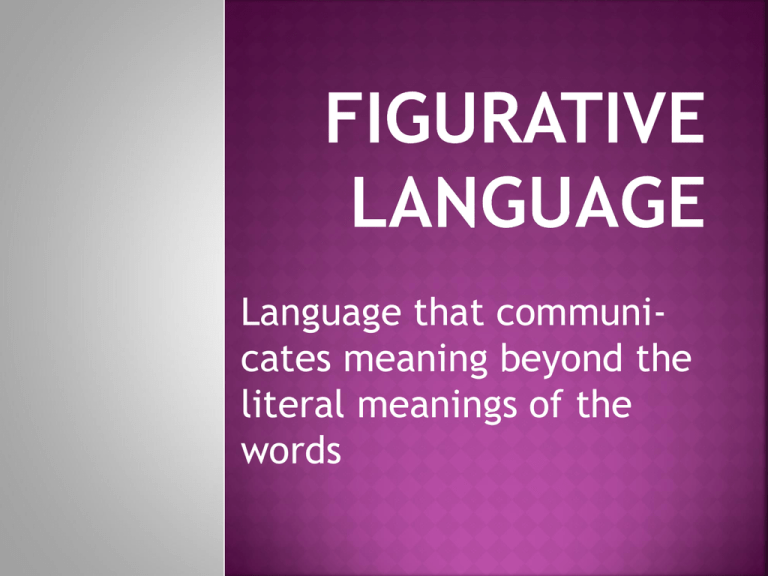
Language that communicates meaning beyond the literal meanings of the words Kennings- Old English metaphorical descriptions used to replace a noun (Ex: “whale road” is a kenning for the sea.) Alliteration- Repetition of initial consonant sounds (Ex: the bloody battle began) Caesura- In old English poetry, the space at the end of or in the middle of lines used to indicate a pause for effect of meaning. Hyperbole- Extreme exaggeration (Ex: “He was stronger than a thousand horses.”) Personification- Giving human traits to inhuman things (Ex: The waves grasped at the boat as the wind screamed its threat against the crew.”) Onomatopoeia- Words that sound like the meaning they convey (Ex: buzz, whisper, gargle, murmur) Imagery- When an author uses words that appeal vividly to the senses (Ex: “The only sound was the roaring sea, the freezing waves.”) Metaphor- A direct comparison between two things (Ex: “Her coffin was a shadow of death in my mind.”) Simile- A comparison using like or as (Ex: “His anger clouded the hearts of men like smoke.”) “sat in secret sessions” (87-88) “fastened those claws in his fists till they cracked, clutched Grendel closer” (284) “Grendel will carry our bloody/Flesh to the moors, crunch on our bones…”(182) “His mind was flooded with fear” (I276) “tormenter of their days” (331-332) “…sorrow heaped at his door” (58) “Hate had triumphed” (58) “death was my errand and the fate they had earned” (158) “agony hung on king and people alike” (106-107) “hammer-forged blades and boarheaded helmets” (404) 1.) Complete the Poetry Sheet for Beowulf by identifying at least TWO of each poetic device listed. For “other,” you must include one kenning and one epithet. For ALL devices, list the quote from the text, the line numbers, and the effect or purpose of the poetic device. Ex: Alliteration - “fastened those claws in his fists till they cracked, clutched Grendel closer” (284) – the alliteration is used to emphasize the sound of the bones cracking. 2.) Create FIVE ORIGINAL KENNINGS. They may be for something related to Beowulf or something modern. Beside each, list what the kenning is naming. Ex: “a prison-house for students” - school A manuscript of miscellaneous AngloSaxon poems dating from around A.D 940 It’s “songs” are our chief source os Anglo-Saxon Poetry Elegiac poems include “The Seafarer” “The Wanderer” “The Wife’s Lament” About 90-96 riddles are contained in the Exeter The manuscript survived numerous raids and fires, but was not well cared for: used as a chopping board; pages marked my beer stains; some pages partially burned. The Exeter Book is preserved at Exeter Cathedral in England Heroic Epic Poetry- focuses upon bravery of central hero (Ex. Beowulf) (Note: The Iliad is also an epic but originates in Greece) Elegiac Lyric Poetry- Expresses mourning due to the passing of better times, death, or other losses; dark mood & bleak fatalism are characteristic of Anglo-Saxon times (Ex: “Seafarer”) Riddles- Anglo- Saxons enjoyed the playful and intellectual challenge of riddles, which described familiar objects in ways that forced the audience to guess their identity. Kennings were often used in riddles, which were written in verse. Author(s) of the riddles unknown Probably short pieces used by scops while audiences were getting settled or as filler between sets during performances of longer epic works, such as Beowulf. Some written in Latin or translations of Latin, suggesting they were strictly written genre Some riddles used “runes,” implying a sense of mystery or magic Test the reader’s or hearer’s knowledge Riddles offer a glimpse of Anglo-Saxon life and beliefs not found elsewhere: Everything in the world is part of a continuum… living creatures with biographies Creatures of the riddles often have to experience pain in the present The creature or observer accepts this pain as natural order or Christian patience Opening- “I saw a wonderful thing…” or “I am a marvel…” Half-lines- Poet probably wished to “measure out” his clues in a specific order and at a specific rate Alliteration is often used throughout ~The scribe who wrote out the riddles did NOT include solutions! Answers are based on the best conjectures of scholars.~ From “lost “Wanderer” in the night, as you never had lived” (94) “kneeling as though he still sat enthroned” (42) “sharing my bread with sorrow” (29) “These rocky slopes are beaten by storms, this earth pinned down by driving snow” (99-100) “storm- beaten blocks besmeared with frost” (75) From “The “Seafarer” world’s honor ages and shrinks, bent like the man who mold it” (89-90) “the cuckoo sings in his murmuring voice” ( 154) “our thoughts should turn toward where our home is… the hope of Heaven” (88) From “I “Wife’s Lament” make this song about me full sadly” (1) “this den in the earth” (28)
